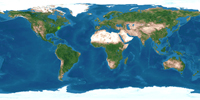
Currently deployed mini-weather probes. Last Updated Dec 14, 1998.

Currently deployed mini-weather probes. Last Updated Dec 14, 1998.
The diversity of our planet is ecological as well as ethnic. As the Internet increases our awareness of each other's culture, we also realize that the experiences that we associate with our "home" are shaped by our local physical environment, whether it be the tropical nights, or the snow where we played with our friends. The Ecoview project is an attempt to map this information, which forms part of our identity.
The data for our map is collected from miniature sensor probes which transmit data to the Internet. In most cases, the transmission is done by people, but this can also be done automatically by the probe itself via satellite, as was done on the Mt. Everest weather probe project. The first generation of sensor probes contain temperature, air pressure, and light sensors. However, in the future, the goal is to include more types of sensors, such as spectral sensors to monitor air pollution or chemical sensors for monitoring water quality or soil conditions. Maybe in the future, sensors can be used to monitor health conditions as well, such as malnutrition and the spread of disease. By seeing a world view of this information, we can more easily recognize trends, and draw attention to potential problems.
This project was developed at the MIT Media Lab, with support from
professors Neil Gershenfeld, Joe Jacobson, Mike Hawley, Justine Cassel, and the Junior
Summit organization. Main contributions: Rich Fletcher, Mathew Gray, Rob Poor,
and Olufemi Omojola. Special Thanks to: Matt Reynolds,
Ravi Pappu, Saul Griffith, Paul Yarin, Clay Harmony,
Yael Macguire, Rehmi Post, Eric Hu, Ben Vigoda, Maria Redin, Leila
Hasan, and Brian Hubert.
For further information, contact:
e-mail: fletcher@media.mit.edu
MIT Media Lab, Rm E15-488
20 Ames St
Cambridge, MA 02139